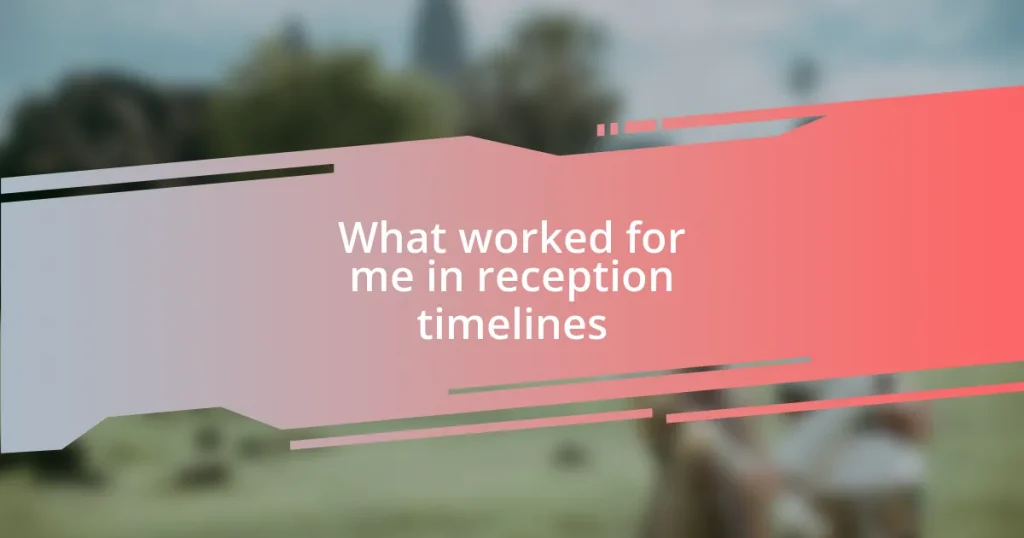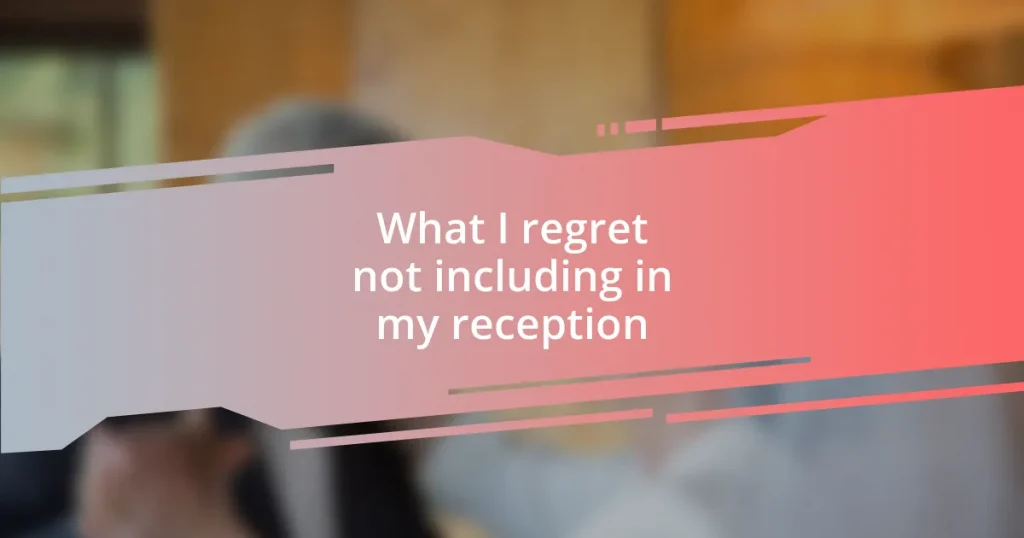Key takeaways:
- Recognizing common planning obstacles such as underestimating time and poor communication can significantly improve project efficiency.
- Setting realistic deadlines and having flexibility in planning can reduce stress and lead to better results.
- Emphasizing teamwork and open communication is essential for successful planning and avoiding misunderstandings.
- Measuring success should include both tangible outcomes and team morale, highlighting the importance of feedback for continuous improvement.

Understanding planning challenges
Planning challenges can often feel overwhelming, especially when you’re juggling multiple tasks or projects. I remember a time when I was coordinating an event and thought I had everything under control. It was only when I realized I’d forgotten a crucial detail that I felt that familiar knot of anxiety in my stomach—does this happen to you, too?
One major challenge I’ve encountered is the unpredictability of external factors. For instance, during a project launch, unexpected delays in supplies threw my timeline off balance. That moment taught me the importance of flexibility in my planning—it’s a reminder that life doesn’t always align with our schedules. Have you ever faced a similar scenario where you had to pivot quickly?
Another aspect that often trips me up is setting realistic goals. I’ve found myself overly ambitious at times, thinking I could achieve the impossible in a short period. This led to a burnout that pushed me to rethink my approach entirely. Have you experienced the pressure of setting lofty goals, only to feel disheartened when they slip through your fingers?

Identifying common planning obstacles
Identifying common planning obstacles often starts with recognizing the barriers that emerge during the process. For me, one of the most significant challenges has been the tendency to underestimate the time required for tasks. I vividly recall a project where I thought a week was sufficient for revisions, only to realize that I had barely scratched the surface by the deadline. Has this ever happened to you, where time just slips away when you’re lost in the details?
Another obstacle that can derail planning is the difficulty in communication among team members. Early in my career, I worked on a collaborative project where lack of clarity led to duplicated efforts and frustration. When we finally took a step back, it became clear that establishing regular check-ins could help mitigate misunderstandings. Have you found that consistent communication can transform everyone’s efficiency?
Additionally, managing competing priorities often becomes a critical factor in effective planning. I remember a time when urgent tasks kept cropping up, pulling my attention away from long-term goals. I’ve learned that sometimes, saying “no” to immediate demands can be just as important as tackling the big projects. Do you struggle with finding that balance, too?
| Obstacle | Description |
|---|---|
| Underestimating Time | Misjudging the time it takes to complete tasks, leading to rushed work. |
| Poor Communication | Lack of effective dialogue among team members resulting in duplication of efforts. |
| Competing Priorities | Struggling to balance urgent tasks with long-term goals, often requiring prioritization. |

Analyzing personal planning failures
Analyzing my personal planning failures has led me to some eye-opening realizations about what goes wrong in my approach. One particularly painful experience was when I planned a family gathering and overlooked crucial dietary restrictions. I was excited to host, but my oversight turned the event into a stressful scramble at the last minute. That taught me to take a step back and assess all details, no matter how minor they seem. Have you had moments when a small detail derailed your plans entirely?
It’s also important to recognize patterns in our planning failures. I noticed that I often rush into projects without fully understanding all the necessary steps. During a community service event I spearheaded, my eagerness led to numerous miscommunications and unfulfilled roles. Reflecting on that chaotic day, I realized that proactive dialogue could have aligned everyone’s expectations from the start. Here’s what I’ve learned so far:
- Detail Awareness: Always triple-check even the smallest details to avoid hiccups.
- Understanding the Process: Break down projects into smaller, manageable tasks to clarify the necessary steps.
- Open Communication: Foster regular conversations with all team members to ensure alignment and shared understanding.
These reflections have been valuable in shaping how I tackle future planning challenges. Do any of these insights resonate with your own experiences?

Strategies for effective planning
When it comes to effective planning, one strategy that has worked wonders for me is setting realistic deadlines. I remember juggling multiple projects and thinking I could finish everything in an unrealistic timeframe. After a particularly stressful week, I decided to break my tasks into smaller chunks with more achievable deadlines. It felt liberating to not only meet my goals but also reduce the anxiety that hung over my head. Have you ever felt that weight lift when you create a more manageable timeline?
Another essential aspect is the power of flexibility in my planning approach. I learned this the hard way after sticking too rigidly to a schedule during a charity event. When unexpected challenges arose, my original plan fell apart, and I felt overwhelmed. Now, I make it a point to build in buffer time that allows for adjustments as needed. It’s a game changer. Don’t you think it’s refreshing when plans can adapt to real-life situations instead of falling apart?
Lastly, utilizing visual tools has transformed the way I approach planning. I have started using mind maps and project boards to visualize my ideas and timelines. This method not only keeps me organized but also ignites my creativity as I see how different elements interconnect. Have you found that a visual representation can spark new ideas and insights in your own projects?

Lessons learned from mistakes
The most impactful lesson I learned from my missteps is that mistakes aren’t just setbacks; they’re often the stepping stones to growth. I vividly recall a time when I neglected to delegate tasks during a major family reunion. As a result, I ended up overwhelmed and exhausted, which made me realize that sharing responsibility not only lightens the load but also fosters deeper connections. Have you ever felt the relief that comes with teamwork rather than going it alone?
Another mistake that stands out for me is when I assumed everyone was on the same page during a group project. My enthusiasm led me to skip over crucial planning meetings, thinking I could manage the chaos later. The reality? It snowballed into confusion and frustration. I’ve learned that clear and consistent communication isn’t optional; it’s foundational. I now prioritize regular check-ins and updates, ensuring everyone is rowing in the same direction. How often do we overlook this vital step in our hurry to get things done?
Finally, I’ve discovered that my perfectionism can often stifle progress. There was a time when I wanted every detail of an event to be flawless, leading to checklists that spiraled out of control. Instead of enhancing my process, it created anxiety and burnout. I’ve since learned to embrace imperfections and focus on the big picture. Sometimes, the most memorable moments arise from unplanned surprises. Have you ever found serendipity in the chaos?

Applying solutions to future plans
As I move forward in my planning endeavors, I’ve found that reflecting on past challenges is invaluable. I recall a recent project where I completely underestimated the time it would take to gather resources. This oversight taught me to always add extra time to my estimates. Have you ever realized that a little foresight can save you from future headaches?
Adopting a solution-focused mindset has also changed how I approach planning. During my last event, instead of fixating on the hiccups, I brainstormed potential obstacles early on. This shift in focus transformed potential crises into manageable tasks. It’s interesting how preparing for pitfalls can turn them into opportunities for creativity, don’t you think?
Lastly, I’ve started to incorporate feedback loops into my planning process. After concluding a project, I now gather insights from my team about what worked and what didn’t. This practice not only refines my strategies but also fosters a culture of continuous improvement. I wonder how many of us miss out on growth opportunities simply by not asking the right questions at the right time.

Measuring success in planning improvements
Measuring success in planning improvements can be quite revealing, especially when I reflect on how far I’ve come. I remember a time when I organized a community fundraiser, and my main metric for success was simply meeting our financial goal. It wasn’t until afterwards, when I evaluated team satisfaction and participant engagement, that I realized true success is multi-dimensional. Have you ever focused solely on one metric only to discover a richer story beneath the surface?
Now, I look for tangible results alongside emotional ones. When I gauge the effectiveness of my planning, I assess not only project completion rates but also how the team felt throughout the process. I distinctly recall a project where team morale was high due to my emphasis on celebration and recognition. Delivering results is great, but when people feel valued, it creates a culture of repeat success. Isn’t it fascinating how a little acknowledgment can foster loyalty and enthusiasm?
I’ve also learned to use specific feedback as a measurement tool. After every major undertaking, I ask participants to rate their experience, which has opened my eyes to areas needing improvement. For instance, during a recent event, I was shocked to discover that while we achieved our objectives, people felt overwhelmed by the schedule. That insight prompted me to incorporate breaks in the future, enhancing everyone’s experience significantly. When was the last time you sought feedback to fine-tune your approach?















